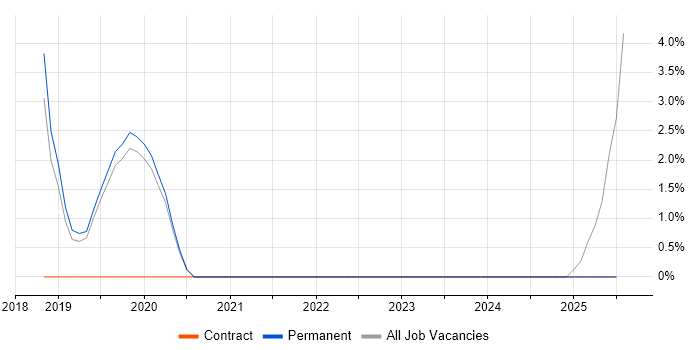Express.js
Lincolnshire > Lincoln
The table below provides summary statistics and contractor rates for jobs advertised in Lincoln requiring Express.js skills. It covers vacancies from the 6 months leading up to 29 August 2025, with comparisons to the same periods in the previous two years.
| 6 months to 29 Aug 2025 |
Same period 2024 | Same period 2023 | |
|---|---|---|---|
| Rank | 8 | - | - |
| Rank change year-on-year | - | - | - |
| Contract jobs citing Express.js | 1 | 0 | 0 |
| As % of all contract jobs advertised in Lincoln | 5.56% | - | - |
| As % of the Libraries, Frameworks & Software Standards category | 33.33% | - | - |
| Number of daily rates quoted | 1 | 0 | 0 |
| 10th Percentile | - | - | - |
| 25th Percentile | £503 | - | - |
| Median daily rate (50th Percentile) | £505 | - | - |
| 75th Percentile | £508 | - | - |
| 90th Percentile | - | - | - |
| Lincolnshire median daily rate | £505 | - | - |
All Software Libraries and Frameworks
Lincoln
Express.js falls under the Software Libraries and Frameworks category. For comparison with the information above, the following table provides summary statistics for all contract job vacancies requiring technical specification, industry standards, software libraries and framework skills in Lincoln.
| Contract vacancies with a requirement for technical specification, industry standards, software libraries and framework skills | 3 | 1 | 1 |
| As % of all contract IT jobs advertised in Lincoln | 16.67% | 7.69% | 3.23% |
| Number of daily rates quoted | 1 | 0 | 0 |
| 10th Percentile | - | - | - |
| 25th Percentile | £503 | - | - |
| Median daily rate (50th Percentile) | £505 | - | - |
| 75th Percentile | £508 | - | - |
| 90th Percentile | - | - | - |
| Lincolnshire median daily rate | £478 | £431 | £625 |
| % change year-on-year | +10.72% | -31.00% | +31.58% |
Express.js
Job Vacancy Trend in Lincoln
Job postings citing Express.js as a proportion of all IT jobs advertised in Lincoln.

Express.js
Co-occurring Skills and Capabilities in Lincoln by Category
The follow tables expand on the table above by listing co-occurrences grouped by category. The same employment type, locality and period is covered with up to 20 co-occurrences shown in each of the following categories:
